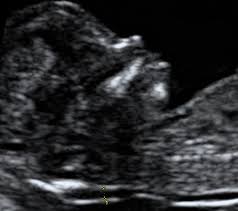A nuchal scan is a very detailed inspection of the fetus between 11 and 14 weeks, which includes measurement of the fluid at the back of the neck: the 'nuchal translucency'. When combined with blood hormone tests, and used to screen for chromosomal abnormalities such as Down's syndrome, it is called the 'Combined test'.
Nuchal scans are performed by Mr Impey and Dr Ioannou.
What the scan does:
1. Look for fetal abnormalities:
Many abnormalities can be diagnosed at this very early stage if sufficient care is taken and the operator has the required skills. Examples include gastroschisis, exomphalos, limb defects, diaphragmatic herniae and some spina bifidas.

2. Screen for chromosomal abnormalities:
Although most babies are healthy, chromosomal abnormalities such as Down's syndrome occur in approximately 1 in 600 births. Down's syndrome is more common in older mothers, but can occur at any age. 'Screening tests' such as the nuchal scan combined with blood hormone tests (Combined test) or Non Invasive Prenatal Testing (NIPT) are available to calculate the chances of an individual baby being affected by Down's syndrome.
It is important to understand that these will not tell you definitely whether your baby has this condition, but they will give you the information to help you to decide if you need to have a diagnostic test (amniocentesis or chorionic villus sampling), which will tell you for sure.